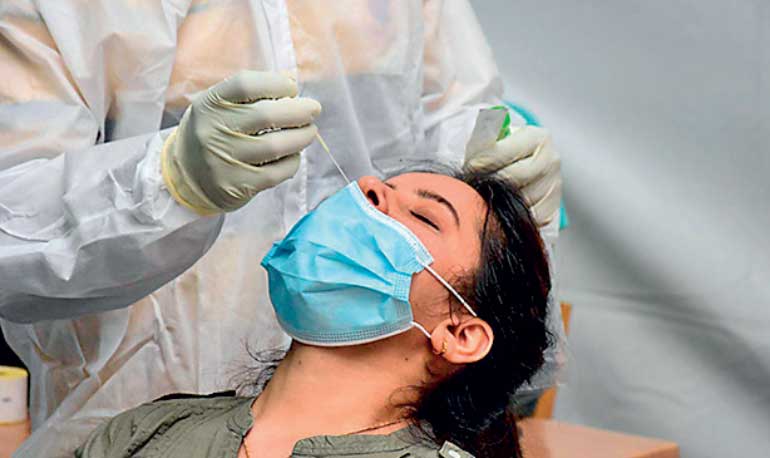Tuesday Feb 17, 2026
Tuesday Feb 17, 2026
Tuesday, 1 March 2022 03:14 - - {{hitsCtrl.values.hits}}

By Shailendree Wickrama Adittiya
Sri Lanka’s COVID-19 case count rose to 646,034 following the detection of 997 COVID-19 patients yesterday.
The previous day, 976 persons from the New Year cluster and one Sri Lankan returnee from overseas tested positive for COVID-19. The Health Promotion Bureau states that 5,371 PCR tests and 2,794 rapid antigen tests were conducted on Sunday.
In total, 540,565 patients from the New Year cluster, 82,785 patients from the Peliyagoda cluster, 9,154 patients from the Prisons cluster and 3,059 patients from the Divulapitiya cluster have been detected.
In addition to this, 7,232 Sri Lankan returnees from overseas and 328 foreigners make up the country’s imported cases.
The Epidemiology Unit states that 134,079 persons from Colombo, 112,106 persons from Gampaha, 57,134 persons from Kalutara, 42,974 persons from Galle, and 30,720 persons from Kurunegala have tested positive for COVID-19.
COVID-19 detections during the third wave of the pandemic include 101,782 persons from Colombo, 93,572 persons from Gampaha, and 50,076 persons from Kalutara.
According to the Epidemiology Unit, 205 persons were discharged from treatment centres yesterday, raising the country’s COVID-19 recoveries to 608,924.
At present, 20,888 persons are receiving medical or home-based care and 1,124 persons suspected of having COVID-19 are under observation.
According to Health Services Deputy Director Dr. Hemantha Herath, 4,608 beds at treatment centres and 73 ICU beds are currently occupied by COVID-19 patients.
Speaking to the media about post-COVID syndrome at the Health Promotion Bureau yesterday, Sri Lanka College of Pulmonologists Past-President and Sri Jayewardenepura Hospital Chest Physician Dr. Geethal Perera said over 80% of respiratory physicians’ work is currently concerning COVID-19.
“In wards, we see that persons who have received the third vaccine dose account for a very small percentage of those who are hospitalised,” he said, explaining that most persons who have received the booster dose but require hospitalisation have low immunity due to organ transplants and medical conditions.
The Chest Physician went on to add that most COVID-19 symptoms ease within seven days of infection, with fatigue easing a month after infection.
“However, there is a group among them that may show no symptoms during the quarantine period but later, when going to work, for instance, may experience breathlessness or coughing. Some develop a fever in the evening. In addition to this, there could be issues with the blood circulatory system and nervous system, like memory loss and difficulty concentrating,” Dr. Geethal Perera said.
When these symptoms persist beyond four weeks after infection, it is considered long-COVID condition.
“The development of post-COVID syndrome is not dependent on the severity of COVID-19 infection. Thus a patient receiving ICU care may make a complete recovery,” he said, adding that persons who show no symptoms can develop post-COVID syndrome.
There is thus no assurance that an individual will not be affected by COVID-19 infection if they are seemingly healthy.
Meanwhile, Dr. Dilhani Samarasekara of the Health Ministry’s Quarantine Unit yesterday clarified the pre-departure testing guidelines issued by Health Services Director General Dr. Asela Gunawardena for overseas travellers.
“Various countries have adjusted their testing methods for arrivals from other countries. As an example, the UK during the second week of February, removed compulsory pre-departure testing for fully-vaccinated travellers,” Dr. Samarasekara said.
She explained that not many overseas arrivals in Sri Lanka test positive for COVID-19 and that Day 1 PCR is only done on persons who are not fully vaccinated. Thus, starting today, fully-vaccinated travellers are exempt from pre-departure testing as well.
“Some countries administer only one dose to persons who previously contracted the disease. All such persons were already exempt from Day 1 PCR testing. However, we are now breaking this group into two for the pre-departure test,” Dr. Samarasekara said, adding, “This exempts only those who contracted COVID-19 seven days to six months prior to departure and have received one vaccine dose from pre-departure testing.”
According to Dr. Samarasekara, persons who have received only one vaccine dose but contracted COVID-19 over six months prior to departure are subjected to pre-departure testing but not Day 1 testing.